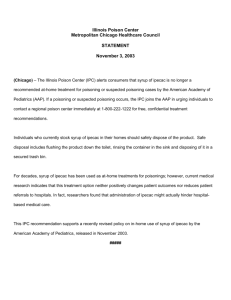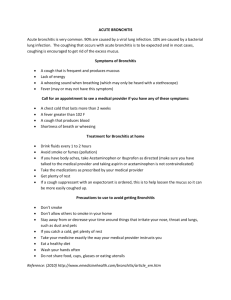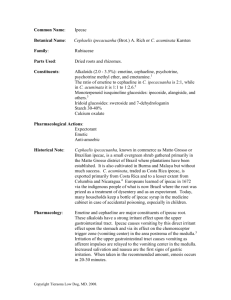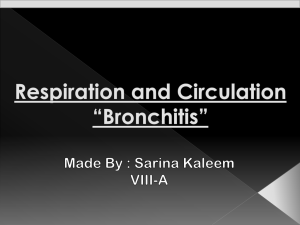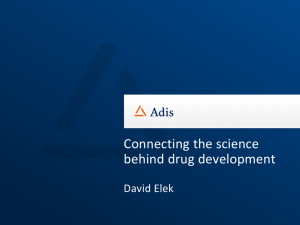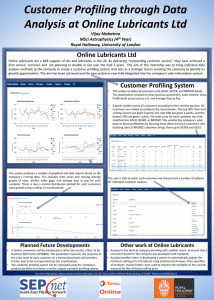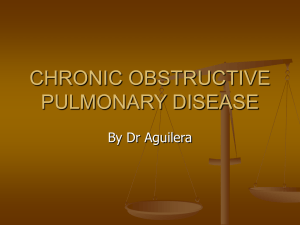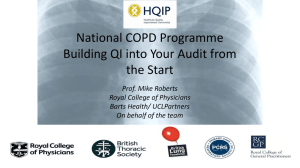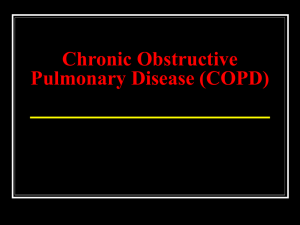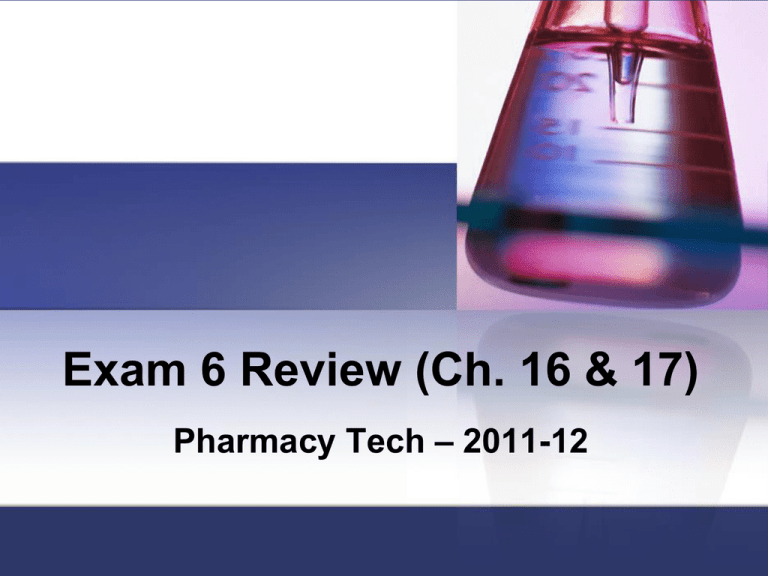
Exam 6 Review (Ch. 16 & 17)
Pharmacy Tech – 2011-12
To
avoid parasites when traveling, you
should refrain from:
a. Salads washed in untreated local
water
b. Unpasteurized milk
c. Freshwater fish
d. All of the above
Answer: d
The
most commonly used agents for
weight reduction are
a. Antiemetics
b. Ipecac syrup
c. Stimulants
d. Emollients / lubricants
Answer: c
Drug(s)
used in emergency situations to
induce vomiting in poisoning cases:
a. Antiemetics
b. Ipecac syrup
c. Stimulants
d. Emollients / lubricants
Answer: b
Drugs that work in the vomiting center (in the
medulla oblongata) to inhibit impulses going
to the stomach which cause vomiting:
a. Antiemetics
b. Ipecac syrup
c. Stimulants
d. Antiflatulents
Answer: a
An
inflammation of the large intestine,
causing it to appear scraped:
a. Diverticular disease
b. Ulcerative colitis
c. Irritable bowel syndrome
d. Hiatal hernia
Answer: b
The
condition that results from a
deficiency of fiber over time:
a. Diverticular disease
b. Ulcerative colitis
c. Irritable bowel syndrome
d. Hiatal hernia
Answer: a
A
condition related to chronic
constipation:
a. Diverticular disease
b. Ulcerative colitis
c. Irritable bowel syndrome
d. Hiatal hernia
Answer: d
Agents
intended to reduce intestinal
gas:
a. Antiflatulents
b. Ipecac syrup
c. Stimulants
d. Antiemetics
Answer: a
These
draw water into the colon and
thus stimulate evacuation.
a. Antiemetics
b. Ipecac syrup
c. Stimulants
d. Emollients / lubricants
Answer: d
These
cause a laxative action by
increasing gut activity through mucosal
irritation:
a. Antiemetics
b. Ipecac syrup
c. Stimulants
d. Emollients / lubricants
Answer: c
The
a.
b.
c.
d.
major function of the GI tract is to
Regulate body temperature
Convert complex food substances into
simpler compounds
Filter waste products
None of the above
Answer: b
A condition characterized by a cough that
produces purulent, green, or blood-streaked
sputum.
a. Chronic bronchitis
b. COPD
c. Pneumonia
d. Emphysema
Answer: a
Cigarette
a.
b.
c.
d.
smoking increases the risk of
Cancer
COPD
Heart disease and stroke
All of the above
Answer: d
An inflammatory lung infection caused by
micro-organisms gaining access to the lower
respiratory tract by aspiration, inhalation or
through the bloodstream.
a. Chronic bronchitis
b. COPD
c. Pneumonia
d. Emphysema
Answer: c
A
lung disease that is transmitted by
respiratory droplets inhaled into the
lungs:
a. Tuberculosis
b. Asthma
c. Bronchitis
d. Cystic fibrosis
Answer: a
A
hereditary disease that affects the
gastrointestinal and pulmonary
systems:
a. Tuberculosis
b. Asthma
c. Bronchitis
d. Cystic fibrosis
Answer: d
A
condition characterized by
destruction of the walls and the tiny
alveoli of the lungs:
a. Chronic bronchitis
b. COPD
c. Pneumonia
d. Emphysema
Answer: d
A
disease in which inflammation causes
the patient’s airway to tighten:
a. Tuberculosis
b. Asthma
c. Bronchitis
d. Cystic fibrosis
Answer: b
This causes inflammation and destroys air
sacs which lose their ability to expand and
contract, and their ability to pass O2 into the
blood and remove carbon dioxide.
a. Chronic bronchitis
b. COPD
c. Cystic fibrosis
d. Emphysema
Answer: b
Also
known as adrenalin, and is the
drug of choice for acute asthma
attacks:
a. Nicoderm
b. Zyban
c. Chantix
d. Epinephrine
Answer: d
These drugs are reserved for more difficult
cases of asthma and may be successfully
used when other drugs are not effective.
a. Beta blockers
b. Corticosteroids
c. Bronchodilators
d. None of the above
Answer: b

